REGIONALSPOTLIGIITWALIS
Page 54
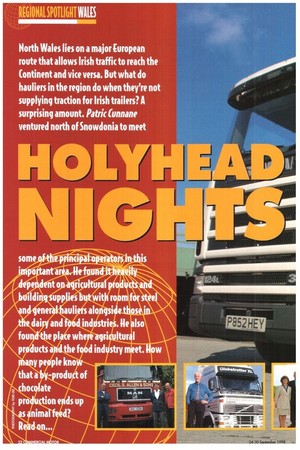
Page 56
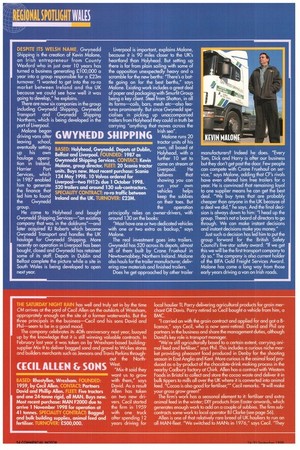
Page 57
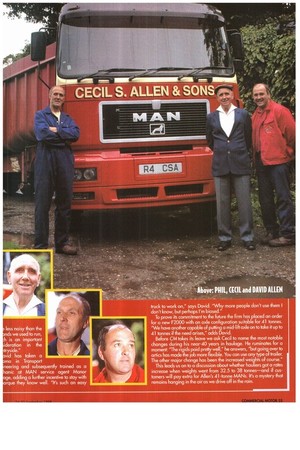
Page 58
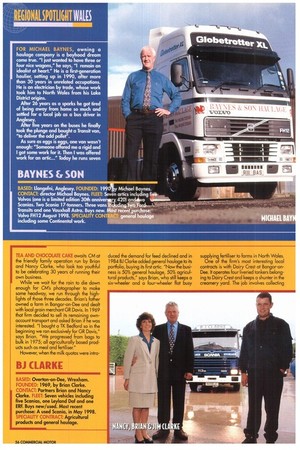
Page 59
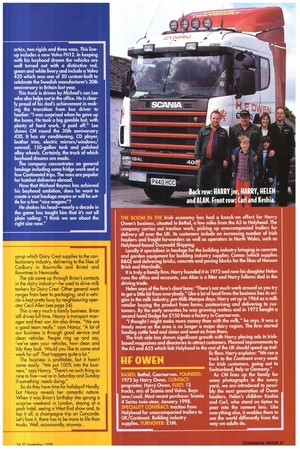
Page 60
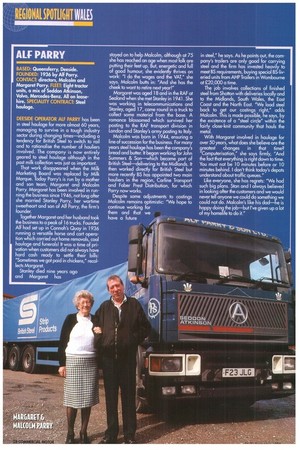
Page 61
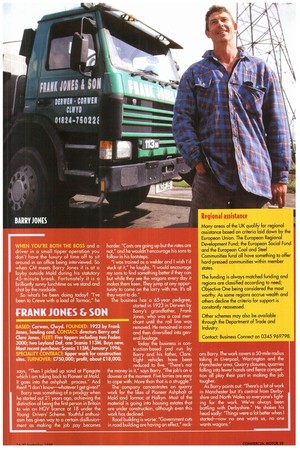
If you've noticed an error in this article please click here to report it so we can fix it.
North Wales lies on a major European route that allows Irish traffic to reach the Continent and vice versa. But what do hauliers in the region do when they're not supplying traction for Irish trailers? A surprising amount. Patric Cunnane ventured north of Snowdonia to meet
R[GIONAL SPOIL1611I WALES
DESPITE ITS WELSH NAME, Gwynedd Shipping is the creation of Kevin Malone, an Irish entrepreneur from County Wexford who in just over 10 years has turned a business generating £100,000 a year into a group responsible for a £23m turnover. "I wanted to get into the ro-ro market between Ireland and the UK because we could see how well it was going to develop," he explains. There are now six companies in the group including Gwynedd Shipping, Gwynedd Transport and Gwynedd Shipping Northern, which is being developed in the port of Liverpool. Malone began driving vans after leaving school, eventually setting up his own haulage operation in Ireland, Harrier Port Services, which in 1987 enabled him to generate the finance that led him to found the Gwynedd group. He came to Holyhead and bought Gwynedd Shipping Services—"an existing company that was in the doldrums"—and later acquired RJ Roberts which became Gwynedd Transport and handles the UK ficiulage for Gwynedd Shipping. More recently an operation in Liverpool has been bought, closed and Gwynedd has retained some of its staff. Depots in Dublin and Belfast complete the picture while a site in South Wales is being developed to open next year.
GWYNEDD
Liverpool is important, explains Malone, because it is 90 miles closer to the UK's heartland than Holyhead. But setting up there is far from plain sailing with some of the opposition unexpectedly heavy and a scramble for the new berths: "There's a battle going on for the best berths," says Malone. Existing work includes a great deal of paper and packaging with Smurfit Group being a key client. Steel from Shaman, in all its forms—coils, bars, mesh etc—also features prominently. But since Gwynedd specialises in picking up unaccompanied trailers from Holyhead they could in truth be carrying "anything that moves across the Malone runs 20 tractor units of his own, all based at Holyhead, with a further 10 set to come on stream at Liverpool. He believes that showing you can run your own vehicles helps keep) the subbies on their toes. But the operation principally relies on owner-drivers, with around 130 on the books.
"Most have one or two dedicated vehicles with one or two extra as backup," says Malone.
The real investment goes into trailers. Gwynedd has 520 across its depots, almost all of them built by Crane Fruehauf in Newtownabbey, Northern Ireland. Malone also hauls for the trailer manufacturer, delivering raw materials and finished trailers.
Does he get approached by other trailer manufacturers? Indeed he does. "Every Tom, Dick and Harry is after our business but they don't get past the door. Few people can compete with Crane Fruehauf on service," says Malone, adding that CF's rivals have even offered him free trailers for a year. He is convinced that remaining loyal to one supplier means he can get the best deal. 'We buy tyres that are probably cheaper than anyone in the UK because of a deal we did," he says. And the final decision is always down to him: "I head up the group. There's not a board of directors to go through. We can make instant decisions and instant decisions make you money." Just such a decision has led him to put the group forward for the British Safety Council's five-star safety award: "If we get this we will be the first iransport company to do so." The company is also current holder of the BIFA Gold Freight Services Award. Malone has come a long way from those early years driving a van on Irish roads.
THE SATURDAY NIGHT RAIN has well and truly set in by the time CM arrives at the yard of Cecil Allen on the outskirts of Wrexham, approprately enough on the site of a former waterworks. But the three principals in the business—Cecil and his sons David and Phil—seem to be in a good mood. The company celebrates its 40th anniversary next year, buoyed up by the knowledge that it is still winning valuable contracts. In February last year it was taken on by Wrexham-based buildingsupplier Mix-It to deliver bagged sand and gravel to Wickes stores and builders merchants such as Jewsons and Travis Perkins throughout the NorthWest.
"Mix-It said they want us to grow with them," says David. As a result Allen has taken on two new drivers. Cecil started the Firm in 1959 with one truck after spending 12 years driving for local haulier TL Parry delivering agricultural products for grain merchant GR Davis. Parry retired so Cecil bought a vehicle from him, a BMC.
"I carried on with the grain contract and applied for and got a Blicence," says Cecil, who is now semi-retired. David and Phil are partners in the business and share the management duties, although David's key role is transport manager.
"We're still agriculturally based to a certain extent, carrying animal feed and fertiliser," says Phil. This includes a curious niche market providing pheasant food produced in Denby for the shooting season in East Anglia and Kent. More curious is the animal food produced as a by-product of the chocolate-drink making process in the nearby Cadbury factory at Chirk. Allen has a contract with Western Foods in Bristol to collect and store the cocoa waste and deliver it in bulk tippers to mills all over the UK where it is converted into animal feed. "Cocoa is also good for fertiliser," Cecil remarks. "It will make your grass grow green!" The firm's work has a seasonal element to it: fertiliser and extra animal feed in the winter; DIY products from Easter onwards, which generates enough work to add on a couple of subbies. The firm subcontracts some work to local operator BJ Clarke (see page 56).
Allen is one of that relatively rare breed of UK hauliers to run an all MAN-fleet. "We switched to MANs in 1976," says Cecil. "They less noisy than the nds we used to run, h is an important ideration in the tryside."
vid has taken a ma in Transport neering and subsequently trained as a anic at MAN service agent Manor ge, adding a further incentive to stay with rque they know well. "It's such an easy truck to work on," says David. 'Why more people don't use them I don't know, but perhaps I'm biased." To prove its commitment to the future the firm has placed an order for a new F2000 with an axle configuration suitable for 41 tonnes. "We have another capable of putting a mid-lift axle on to take it up to 41 tonnes if the need arises," adds David.
Before CM takes its leave we ask Cecil to name the most notable changes during his near-40 years in haulage. He ruminates for a moment: 'The rigids paid pretty well," he answers, "but going over to at-tics has made the job more f exible. You can use any type of trailer. The other major change has been the increased weights of course." This leads us on to a discussion about whether hauliers got a rates increase when weights went from 32.5 to 38 tonnes—and if customers will pay extra for Allen's 41-tonne MANs. It's a mystery that remains hanging in the air as we drive off in the rain.
FOR MICHAEL BAYNES, owning a haulage company is a boyhood dream come true. "I just wanted to have three or four nice wagons," he says, "I remain an idealist at heart." He is a first-generation haulier, setting up in 1990, after more than 30 years in unrelated occupations. He is an electrician by trade, whose work took him to North Wales from his Lake District origins.
After 26 years as a sparks he got tired of being away from home so much and settled for a local job as a bus driver in Anglesey. After five years on the buses he finally took the plunge and bought a Transit van, "to deliver the odd pallet".
As sure as eggs is eggs, one van wasn't enough: "Someone offered me a rigid and I got some work for it. Then I was offered work for an artic..." Today he runs seven artics, two rigids and three vans. This lineup includes a new Volvo FH12. In keeping with his boyhood dream the vehicles are well turned out with a distinctive red, green and white livery and include a Volvo 420 which was one of 30 custom-built to celebrate the Swedish manufacturer's 30th anniversary in Britain last year.
This truck is driven by Michael's son Lee who also helps out in the office. He is clearly proud of his dad's achievement in making the transition from bus driver to haulier: "I was surprised when he gave up the buses. He took a big gamble but, with plenty of hard work, it paid off." Lee shows CM round the 30th anniversary 420. It has air conditioning, CD player, leather trim, electric mirrors/windows/ sunroof, 150-gallon tank and polished alloy wheels. Certainly, the truck of which boyhood dreams are made.
The company concentrates on general haulage including some fridge work and a few Continental trips. The vans are popular for hotshot deliveries abroad.
Now that Michael Baynes has achieved his boyhood ambition, does he want to create a vast haulage empire or will he settle for a few "nice wagons"?
He shakes his head—nearly a decade in the game has taught him that it's not all plain sailing: "I think we are about the right size now."
BAYNES Ey SON
BASED: Llangefni, Anglesey. FOUNDED: 199X Michael Baynes. CONTACT: director Michael Baynes. REEF Seven artics including five Volvos (one is a limited edition 30th anniverury 420) anditwo Scanias. Two Scania 17-tonners. Three vans including two Ford. Transits and one Vauxhall Astra. Buys new. Most recent purchase:
Volvo FH12 August 1998. SPECIAUTY CON general haulage including some Continental work.
TEA AND CHOCOLATE CAKE awaits CM at the Friendly family operation run by Brian and Nancy Clarice, who look too youthful to be celebrating 30 years of running their own business.
While we wait for the rain to die down enough for CM's photographer to make some headway, we run through the highlights of those three decades. Brian's father owned o farm in Bangor-on-Dee and dealt with local grain merchant GR Davis. In 1969 that firm decided to sell its remaining ownaccount transport and asked Brian if he was interested. "I bought a TK Bedford so in the beginning we ran exclusively for OR Davis," says Brian. "We progressed From bags to bulk in 1975; all agriculturally based products such as meal and fertiliser."
However, when the milk quotas were intro duced the demand for feed declined and in 1 984 BJ Clarke added general haulage to its portfolio, buying its first artic. "Now the business is 50% general haulage, 50% agricultural products," says Brian, who still keeps a six-wheeler and a four-wheeler flat busy supplying fertiliser to Farms in North Wales. One of the Firm's most interesting local contracts is with Dairy Crest at Bangor-onDee. It operates Four liveried tankers belonging to Dairy Crest and keeps a shunter in the creamery yard. The job involves collecting
syrup which Dairy Crest supplies to the confectionery industry, delivering to the likes of Cadbury in Bournville and Bristol and Rowntree in Newcastle.
The job came up through Brian's contacts in the dairy industry—he used to drive milk tankers for Dairy Crest. Other general work ranges from beer to packaging, and a vehicle is kept pretty busy by neighbouring operator Cecil Allen (see page 54). This is very much a family business. Brian still drives full time, Nancy is transport manager and their son Jim also drives. "We are a good team really," says Nancy, "A lot of our business is through good service and clean vehicles. People ring up and say, 'we've seen your vehicles, how clean and tidy they look. Would you like to come and work for us?' That happens quite a lot." The business is profitable, but it hasn't come easily. "We put 100% into the business," says Nancy, 'There's no such thing as nine to five we're in Saturday and Sunday if something needs doing." So do they have time for holidays? Hardly, but Nancy reveals her romantic nature. When it was Brian's birthday she sprung a surprise weekend in London, staying at a posh hotel, seeing a West End show and, to top it all, a champagne trip on Concorde. Let's face it, there has to be more to life than trucks. Well, occasionally, anyway...
BJ CLARKE
BASED: Overton-on-Dee, Wrexham. FOUNDED: 1969, by Brian Clarke. CONTACT: Partners Brian and Nancy Clarke. FLEET: Seven vehicles including five Scanias, one Leyland Daf and one ERE Buys new/used. Most recent purchase: A used Scania, in May 1998. SPECIALITY CON k ACT: Agricultural products and general haulage.
AL F PARRY
BASED: Queensferry, Deeside. FOUNDED: 1936 by Alf Parry. CONTACT: directors, Malcolm and Margaret Parry. FLEET: Eight tractor units, a mix of Seddon Atkinson, Volvo, Mercedes-Benz. All on leasehire. SPECIALITY CONTRACT: Steel haulage.
DEESIDE OPERATOR ALF PARRY has been in steel haulage for more almost 60 years, managing to survive in a tough industry sector during changing times—including a tendency for British Steel to switch to rail and to rationalise the number of hauliers involved. The company is now entirely geared to steel haulage although in the past milk collection was just as important. That work disappeared when the Milk Marketing Board was replaced by Milk Marque. Today Parry's is run by a mother and son team, Margaret and Malcolm Parry. Margaret has been involved in running the business since 1946, not long after she married Stanley Parry, her wartime sweetheart and son of Alf Parry, the firm's founder.
Together Margaret and her husband took the business to a peak of 16 trucks. Founder Alf had set up in Connah's Quay in 1936 running a versatile horse and cart operation which carried out home removals, coal haulage and funerals! It was a time of privation when customers did not always have hard cash ready to settle their bills: "Sometimes we got paid in chickens," recollects Margaret.
Stanley died nine years ago and Margaret has stayed on to help Malcolm, although at 75 she has reached an age when most folk are putting their feet up. But, energetic and full of good humour, she evidently thrives on work: "I do the wages and the VAT," she says. Malcolm butts in: "And she has the cheek to want to retire next year!" Margaret was aged 18 and in the RAF at Sealand when she met Stanley in 1941. She was working in telecommunications and Stanley, aged 17, came round in a truck to collect some material from the base. A romance blossomed which survived her posting to the RAF transport division in London and Stanley's army posting to Italy. Malcolm was born in 1944, ensuring a line of succession for the business. For many years steel haulage has been the company's bread and butter. It began working for John Summers & Son—which became part of British Steel—delivering to the Midlands. It then worked directly for British Steel but more recently BS has appointed two main hauliers in the region, Canine Transport and Faber Prest Distribution, for which Parry now works.
Despite some adjustments to costing& Malcolm remains optimistic: "We hope to continue working for them and that we have a future in steel," he says. As he points out, the company's trailers are only good for carrying steel and the firm has invested heavily to meet BS requirements, buying special BS-liveried units from AHP Trailers in Wombourne at .£20,000 a time.
The job involves collections of finished steel from Shoiton with deliveries locally and to the Midlands, South Wales, the East Coast and the North East. 'We load steel back to get our costings right," adds Malcolm. T is is made possible, he says, by the existence of a "steel circle" within the fairly close-knit community that hauls the metal.
With Margaret involved in haulage for over 50 years, what does she believe are the greatest changes in that time? "Computerisation," she says firmly, "And the fact that everything is right down to time. You must not be 10 minutes before or 10 minutes behind. I don't think today's depots understand about traffic queues." Like everyone, she has regrets: "We had such big plans. Stan and I always believed in looking after the customers and we would never tell anyone we could do something we could not do. Malcolm's like his dad—he is happy doing the job—but I've given up a lot of my homelife to do it."
FRANK JONES & SON
BASED: Corwen, Clwyd. FOUNDED: 1923 by Frank Jones, hauling coal. CONTACT: directors Barry and Clare Jones. FLEET: Five tippers including two Foden 3000; two Leykind Daf, one Scania 113M. Buys new. Most recent purchase: Scania 113M, January 1996. SPECIALITY CONTRACT: tipper work for construction sites. TURNOVER: £750,000; profit, about £18,000.
WHEN YOU'RE BOTH THE BOSS and a driver in a small tipper operation you don't have the luxury of time off to sit around in an office being interviewed. So when CM meets Barry Jones it is at a layby outside Mold during his statutory 45-minute break. Fortunately it is a brilliantly sunny lunchtime as we stand and chat by the roadside. So what's he been doing today? "I've been to Crewe with a load of Tarmac," he says, 'Then I picked up sand at Pipegate which I am taking back to Pioneer at Mold. It goes into the ashphalt process." And then? "I don't know—whatever I get given!" Barry was something of a prodigy when he started out 21 years ago, achieving the distinction of being the first person in Britain to win an HGV licence at 18 under the Young Drivers' Scheme. Youthful enthusiasm has given way to a certain disillusionment as making the job pay becomes harder. "Costs are going up but the rates are not," and he wouldn't encourage his sons to follow in his footsteps. "I was trained as a welder and I wish I'd stuck at it," he laughs. "I would encourage my sons to find something better if they can but while they see the wagons every clay it makes them keen. They jump at any opportunity to come on the lorry with me. It's all they want to do." The business has a 65-year pedigree, started in 1923 in Derwen by Barry's grandfather, Frank Jones, who was a coal merchant until the rail line was removed. He remained in coal and then diversified into general haulage. Today the business is contruction-based and run by Barry and his father, Clare. Eight vehicles have been reduced to five. "There's not the money in it," says Barry. "The job's on a downer at the moment. Five lorries are easy to cope with. More than that is a struggle." The company concentrates on quarry work for the likes of Pioneer Ashphalt at Mold and Tarmac at Halkyn. Most of the material is going into housing estates that are under construction, although even this work has declined.
Road building is worse: "Government cuts in road building are having an effect," reck ons Barry. The work covers a 50-mile radius taking in Liverpool, Warrington and the Manchester area. Quarry closures, quarries falling into fewer hands and fierce competition all play their part in making the job tougher. As Barry points out: "There's a lot of work in Manchester but it's central from Derbyshire and North Wales so everyone's fighting for the work. We've always been battling with Derbyshire." He shakes his head sadly: "Things were a lot better when I started—now no one wants us, no one wants wagons."
Regional assistance
Many areas of the UK qualify for regional assistance based on criteria laid down by the European Union. The European Regional Development Fund; the European Social Fund and the European Coal and Steel Communities fund all have something to offer hard-pressed communities within member states.
The funding is always matched funding and regions are classified according to need; Objective One being considered the most worthy. As some regions accrue wealth and others decline the criteria for support is constantly reassessed.
Other schemes may also be available through the Department of Trade and Industry.
Contact: Business Connect on 0345 969798.




























































































































